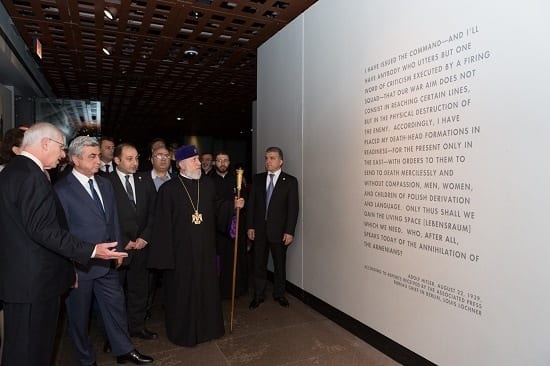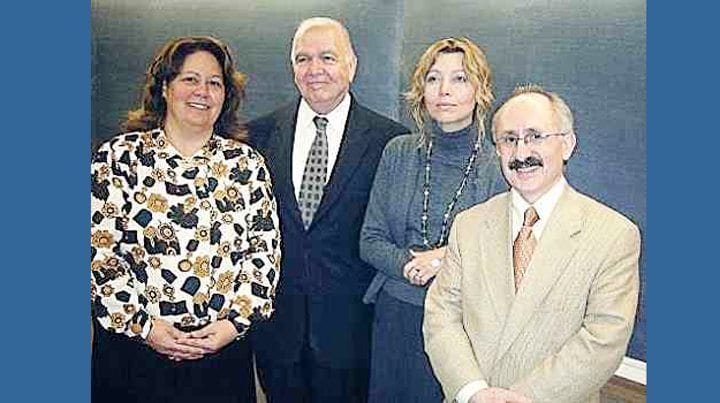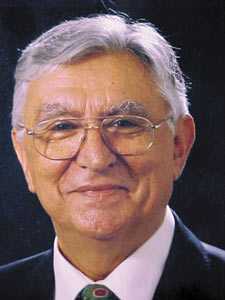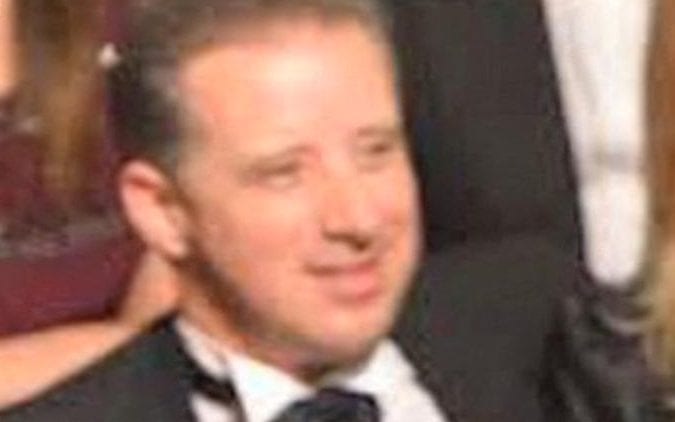
By: Cengiz Özakinci – History Writer, Researcher and Editor
(Translated from Turkish “Bütün Dünya” March 2018 , Monthly Magazine of Baskent University)
FORGED HITLER QUOTE ACCUSING TURKEY IN
US HOLOCAUST MEMORIAL MUSEUM
The Second World War began on September 1, 1939, with the invasion of Poland by the German Military. Hitler, in fact, gave his invasion orders ten days before this date in a secret meeting he held on August 22, 1939 where he addressed his top generals with a lengthy speech. The world war that started with Hitler Germany’s invasion of Poland would last six years, claiming millions of lives and causing significant tangible and intangible destruction.
In 1945, US, England and Russia had already beaten Germany and had started the process of gathering any and all available evidence to try German officers in Nuremberg International Tribunals. Among the evidential documents seized by the US Military in Saalfelden, Austria, in 1945, there were notes taken on the day of August 22, 1939 at the meeting where Hitler ordered the invasion of Poland.
Later in 1942, Louis P. Lochner, the Berlin Correspondent of Associated Press, published a book titled “What About Germany”. In that book, Lochner included a text of this speech of Hitler’s, attributing it to “a source”. However, there were significant differences between the speech version Lochner quoted and those seized in Saafelden, in 1945. For instance, Lochner claimed in his book that Hitler said:
“Our strength lies in our quickness and in our brutality; Genghis Khan has sent millions of women and children into death knowingly and with a light heart. History sees in him only the great founder of States. It’s a matter of indifference to me what a weak western European civilization will say about me. I have issued the command – and I’ll have anybody who utters but one word of criticism executed by a firing squad – that our war aim does not consist in reaching certain lines, but in the physical destruction of the enemy. Accordingly, I have placed my death-head formations on readiness – for the present time only in the East – with orders to them to send to death mercilessly and without compassion, men, women, and children of Polish derivation and language. Only thus, shall we gain the living space (Lebensraum) which we need. Who, after all, speaks today of the annihilation of the Armenians?”
Hitler, with Generals of the German Army
However, the other versions of Hitler’s speech that were found among the Nazi archival documents or in other documents presented by the defense, there was not a single line of speech that spoke of the Armenians.
The words attributed to Hitler in Lochner’s book, published in 1942.
The Military Prosecution found that the text offered in Lochner’s book was based on a dubious source and therefore did not use this text as evidence in the trial process. Interpreter Carlos Porter later reviewed the three pages of speech text that Lochner claimed to have “received from a source and immediately forwarded a copy to the US Embassy in 1939”. Porter determined that not only this text was typed with a typewriter that did not have a German keyboard but also that the text was written with a bad German.
Some 30 years following the Nuremberg Trials, there has been an effort to establish a Holocaust Memorial Museum in The United States to commemorate the victims of the Holocaust. In those years where Turkish diplomats were being assassinated by ASALA terror organization, an Armenian-American man named Set Momjian who made his way to the Museum administration promised a donation of $1,000,000 in exchange for the Museum to provide a display to remember the events of 1915. When the news reached to Turkey that Holocaust Memorial Museum would provide a space for Armenian genocide propaganda, it was met with disappointment; The Ministry of Foreign Affairs have made attempts to prevent this move while our press began to mold a public opinion against the Armenian propaganda.
In the beginning of 1980s, prominent Armenian scholars in The United States proposed the Museum to display the quote “Who, after all, speaks today of the annihilation of the Armenians?”According to these folks, the first genocide of the century was perpetrated against the Armenians in 1915. Not only that, they claimed that in planning his genocide against Jews, Hitler was inspired by the fact that what has been done to Armenians had been forgotten and had gone unpunished. For that matter, it was important to them that Hitler’s Armenian quote to be displayed at the Holocaust Memorial Museum.
Propaganda Posters claiming that the Holocaust was based on 1915 Armenian relocation.
As all this propaganda continued in The United States, in a booklet he prepared in two languages (English and French) titled: “Hitler and the Armenian Question / Hitler et la Question Armenienne”, Prof. Turkkaya Ataov showed us that this forged Hitler quote was used by many US Senators and Congressmen in their addresses to the House and Senate and proved based on the Nuremberg trial documents, that this quote did not belong to Hitler. A year after Ataov’s revelation, in 1985, Prof. Heath W. Lowry wrote an article titled: “The U.S. Congress and Adolf Hitler on the Armenians” in which he proved that this so-called Hitler quote that was being intended to be displayed at the Museum was forged or “spurious”.
Armenian propagandists did not take even one step backwards on their intent to display this Hitler quote at the Holocaust Museum despite all the evidence to suggest that the quote was a forgery. Jews who lived in The United States got divided into two camps: A majority with a Pro-Israel stance saying “The Jewish Holocaust is an unprecedented event and it may not be marginalized by getting mixed up with other genocide claims” and a minority thinking that it is unwise to oppose the opinions of US Presidents (such as Jimmy Carter, Ronald Reagan and Bill Clinton) who favored providing a space in the Holocaust Museum for Armenians as a continuation of the formal US policy.
The Memorial Museum Council declared in December of 1987 that the “Armenian genocide will be included in all of the Museum’s current studies for being the first genocide of the 20th century” and Museum Council’s President Harvey Meyerhoff declared later at the Museum’s Foundation Laying Ceremony – which was attended by Ronald Reagan himself- that the decision to include Armenian genocide claims in the Museum was final.
Taking five years to build, the Museum was opened to public on April 26, 1993 following an opening ceremony held on April 22, 1993. However, due to strong diplomatic reaction from Turkey, Museum administration decided not to display the Armenian genocide propaganda and the forged Hitler quote.
However, from a picture taken during Armenian President Serge Sarkisian’s visit on May 6, 2015, we found out that the forgery Hitler quote that has long been used as an Armenian propaganda tool was being displayed at the Museum despite the decision made in the 1993 opening.
Armenian President Serge Sarkisian, Armenian Patriarch and CatholicosKarekin II, Foreign Minister of Armenia and Minister of Diaspora, Archbishop KhajagBarsamian, The Metropolite of Diocese of Armenian Church of America (Eastern) and others, under guidance of Arthur Berger, Senior Advisor, standing in front of the forged Hitler quote at The US Holocaust Memorial Museum (May 6, 2015 – Photo: US Holocaust Memorial Museum)
Researcher Sukru Server Aya, who literally took every Armenian claim one by one and repudiated them in his books with solid evidences, has also proven that this quote attributed to Hitler was indeed a forgery. (For reference, see “Genocide of Truth”, Istanbul University of Commerce, 2008, p.366, “Genocide Traders”, Derin Publishing, Jan. 2009, pgs. 205-206, “Genocide of Truth Continues”, Derin Publishing, Dec 2010, pgs 249-270)
A few books of Sukru Server Aya (pic. above), proving the falsehood of the Armenian propaganda lies.
In response to this forged Hitler quote appearing on The Wall Street Journal, in an article penned by Robert M. Morgenthau on January 25, 2018, S.S. Aya wrote the following to the Editors of The Wall Street Journal, The Administrators of The Holocaust Memorial Museum in Washington and the Office of the Presidency (the Museum Administrators report to):
“Esteemed Gentlemen,
As private researchers and writers on the WW-1 and WW-2 History and events related to the “mythomania of genocide” (Erich Feigl) we are profoundly disturbed by the domineering tone of the author and feel compelled to refute the contents of this article from A to Z, since almost everything written by former New York District Attorney Robert M. Morgenthau is untrue, not evidenced, and flawed with colossal deficiency of knowledge on past and present history. The “alleged Hitler Quote” still standing on the wall of the Museum is a complete forgery, which undoubtedly has been known to the Museum from the very early days for more than twenty years. Regrettably, despite written applications and provided documentary as evidence, the Museum preferred, or was probably told to, “remain quiet, hide and falsify history” to the public. The Museum has become instrumental in propagating the “genocide palaver”, despite all judicial requirements and verdicts of various authorized courts in Europe. (…)
The US archives are full of official documents bearing references of the US Congress and Senate contradicting his article and yet, Mr. Morgenthau, a celebrity in law and justice, has either ignored or defied by “acting as a persecutor, without hearing any defense, no evidence, and no obedience to nor respect for the laws of this land and as a judge or deity for eternity”.
We submit that this cannot be accepted, and we respectfully request a statement from Wall Street Journal whether or not it subscribes to Mr. Robert M. Morgenthau’s claims of Armenian Genocide.”
***
“A lie travels around the globe while the truth is putting on its shoes”, says Mark Twain. However, the propaganda lies of powerful lobbies seem to be capable of traveling one thousand times around the globe.
In my previous article, I have exposed and repudiated the popular propaganda idea claiming: “Hitler and the Nazi Party were inspired by Kemalism, Ataturk and the Turkish War of Independence”. In this article, we repudiated with proof, the idea that “Hitler’s genocide on Jews was inspired by 1915 relocation of the Armenians”.
It would appear that The West tries hard to prove that the ideology behind Hitler’s fascism and genocidal behavior -which stained their history- emanated from Turks, and not from them. I submit that it is important that we see such lies and slanders being mounted against us as a ground work, preparatory to future invasions and attacks on Turkish soil. Thus, combating such lies and slanderous allegations is a prerequisite for “peace at home, peace in the world”. A world that is dominated by lies will only lead to more wars. *
< By: Cengiz Özakinci – History Writer, Researcher and Editor> [email protected]
(Translated by Emre Serbest)
REMEMBRANCE & DEVELOPMENTS
“The Wall Street Journal” dated 25.1.2018 had published a letter written by the retired New York District Attorney, Robert Morgenthau, who was Jew and the grandson of Henry Morgenthau Sr. USA’s Istanbul Ambassador in the 1915s. https://www.wsj.com/articles/will-trump-tell-the-truth-about-the-armenian-genocide-1516925489. Robert Morgenthau was asking President Trump, to declare April 24, the day of “Armenian genocide”, the same way he had declared Jerusalem to be the capital of Israel. As evidence he referred to the quote on the walls of the Washington Holocaust Museum, a sentence that Hitler (allegedly) said in 1939. The inscription on the wall was wrong and was a lie and the Museum was aware of this fact from the very early years but they kept it there likely to comply with the wishes f Presidents Carter, Reagan, Bush, Clinton, Bush, Obama as the high authority of the Museum Administration. The complaints of some Turks (Melih Berk, Turkkaya Ataov, Sevgin Oktay, Sukru S. Aya…) were all from “individuals and not from an official”. None of them were replied to, despite additional documentary evidences.
On 13.2.2018 a Research Paper and Cover letter co-signed by Sukru S. Aya, Ata Atun and Yurdagül Atun was e-mailed to the Washington Holocaust Museum, the White House and about a hundred senators and congress members. These document which were previously shared, can be sent again on request. These original documents in English were translated into Turkish for Turkish offices and sent by express cargo to the Office of Prime minister, President and Foreign Affairs office, by adding a Turkish informative page, having included as document my book “Buyuk Yalan”. Another package was sent to the US Embassy Press Attaché in Ankara. Furthermore, Mr. Arslan Bulut in his column on “Yenicag” Newspaper dated 15.2.2018 wrote a descriptive article explaining the importance of this subject under the heading: “USA opens the third front”. I did not expect any reply from the USA since (the lie is clear and cannot be denied). But more sorrowful is the fact that none of our administrators could see the “importance of this chance” and there was no response whatsoever.
Mr. Cengiz Özakinci, as writer of several books and being reputed for his meticulous researches, is also the editor of “Bütün Dünya” (The Whole World) monthly Cultural Publication of the Baskent University.
In the March 2018 issue of the magazine, Ozakıncı goes into the details with evidential documents of this “Hitler Lie” and relation to the State Administered Holocaust Museum and he shows that this cannot be denied by official historical documents and presents all this to the knowledge of READERS and THOSE WHO SHOULD BE INTERESTED. The Turkish photocopy of the article is attached along with the English translation. I do pray with my exhausted patience, that a responsive reader will finally see and understand the documentary value of this Armenian-USA lie and the inexplicable bigotry, which otherwise lead to a new slander from President Trump,.
Sukru Server Aya








